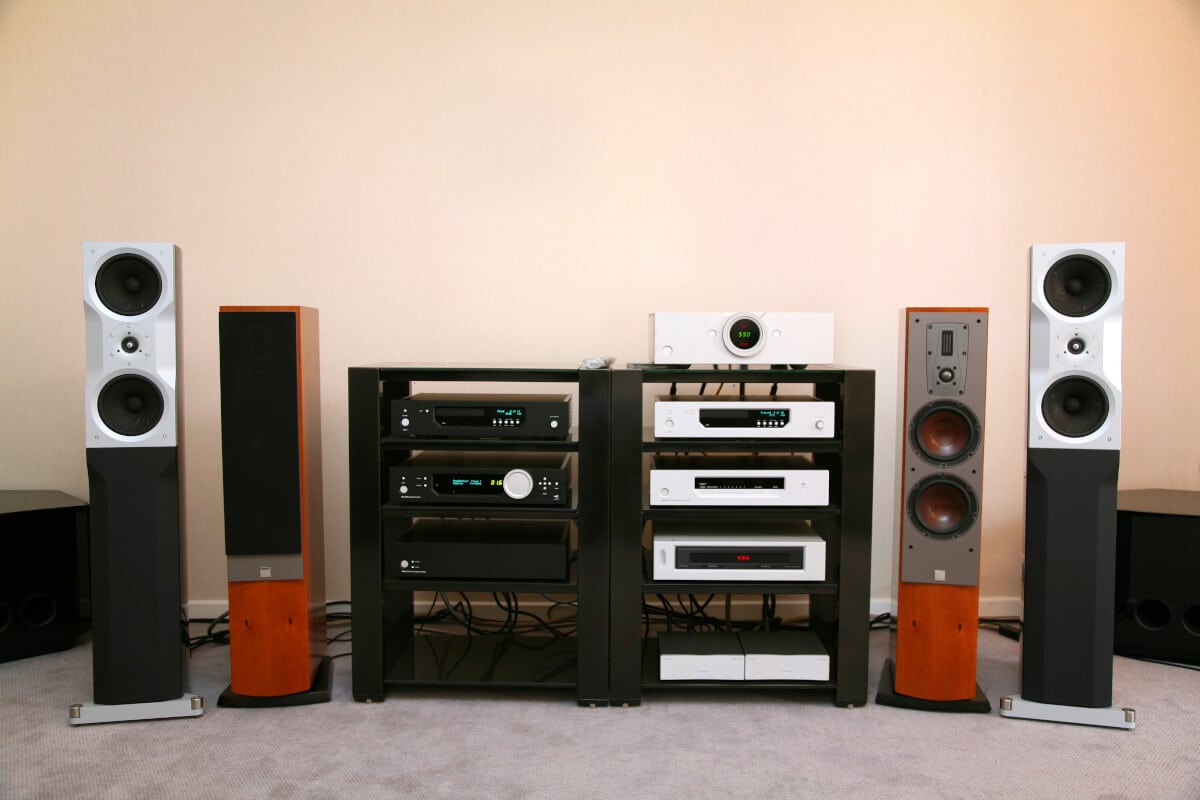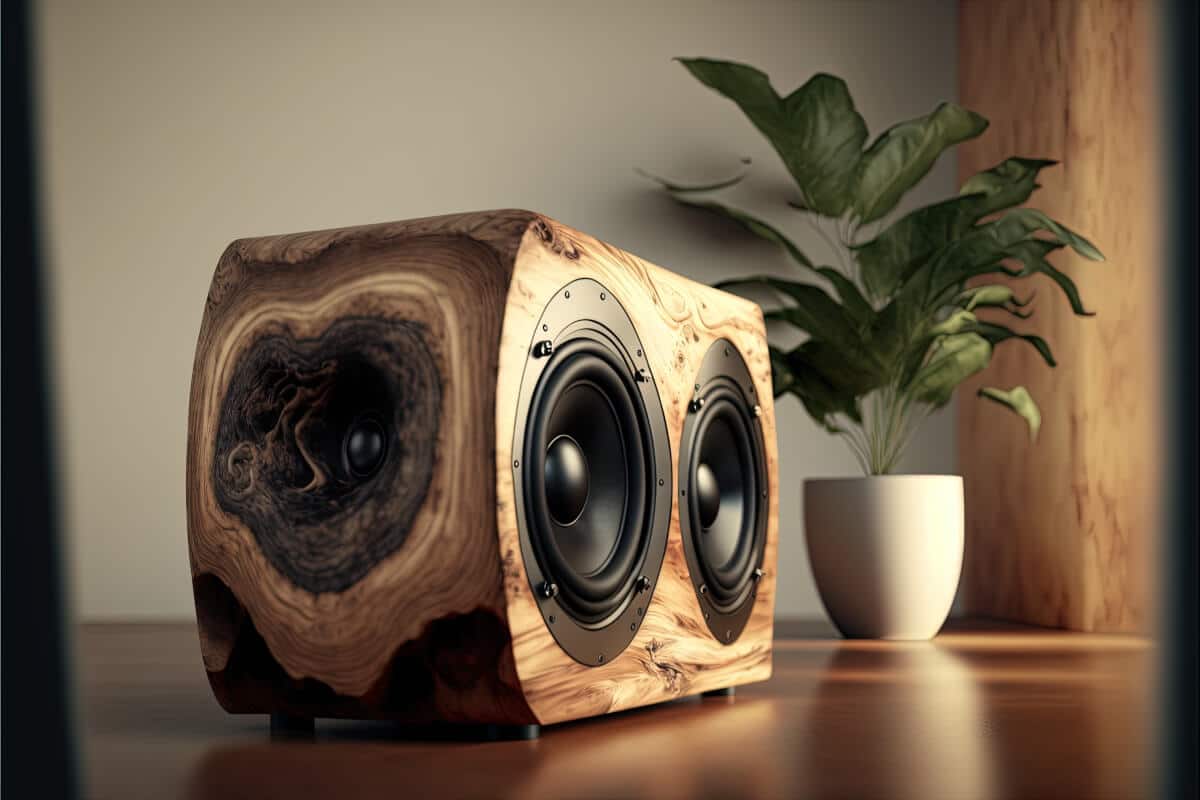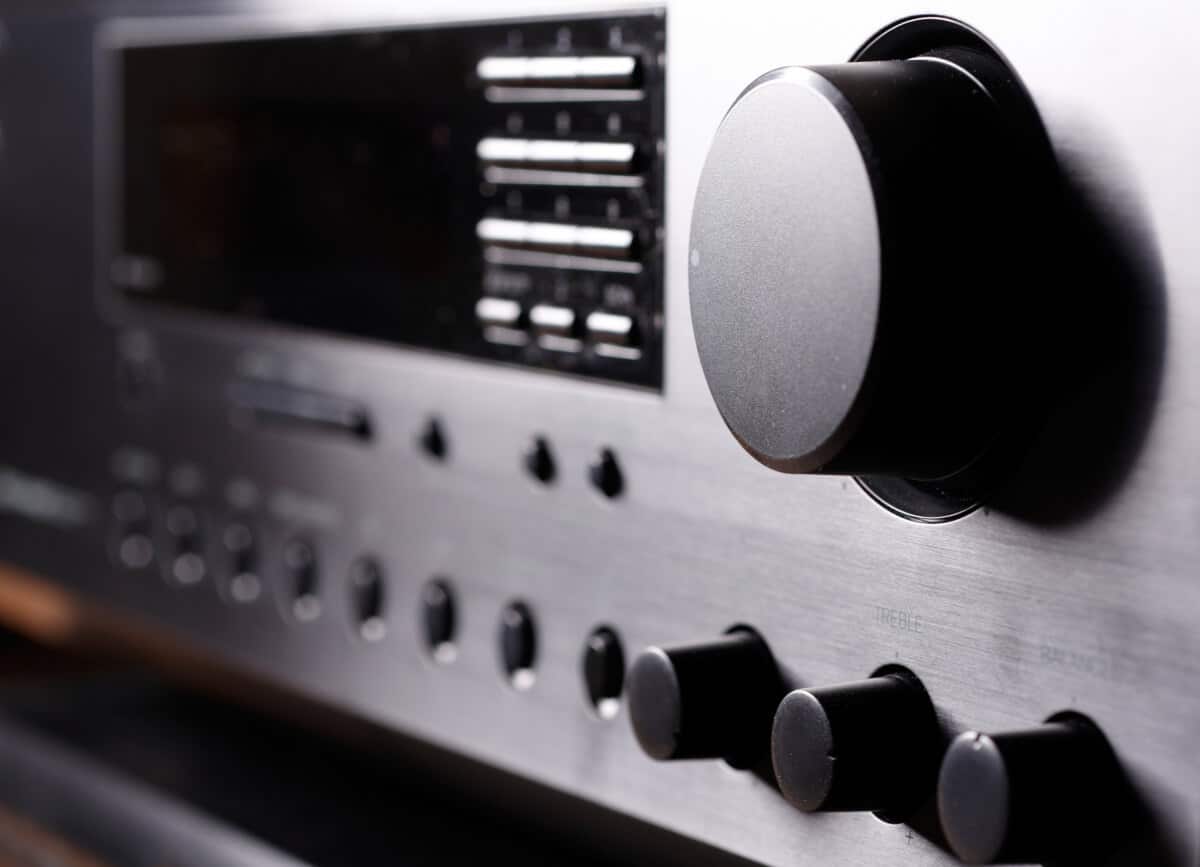the essentials in brief
There is no exact answer to how much a sound system will cost as the cost depends on many factors. More about this here..
The right sound system depends on your specific needs, such as: B. the scope. More about this here..
A soundbar system or a home theater system with surround sound speakers are good options for a sound system. More here..
Sound systems offer a great experience for your home. But what makes a home sound system? What types are there? Which Loudspeakers are needed? What makes a good sound system for the TV? What do you have to consider when buying? Everything you need to know is in the following article.
Contents
How sound systems are changing the way we listen to music

A sound system for your home is a technical setup made up of different components that work together to turn a music source into an immersive audio experience. The basic components of a sound system are a amplifier, Loudspeakers, a signal processor and various audio sources such as CDs, MP3 player or streaming services.
What makes home sound systems so special is their ability to play music in breathtaking quality and volume. As technology develops, sound systems have increasingly powerful amplifiers and Loudspeakers get able to create a space with incredible Klang to fill.
But sound systems are not just for private use. They are also used in a variety of public venues such as: B. Concert arenas, clubs and festivals. This Systems must be capable of enormous SPL and produce a wide spread of sound to reach the crowd.
But the future of sound systems goes further. With the introduction of new technologies such as virtual reality and augmented reality, sound systems can now also offer a more immersive experience. For example, you can use VR headsets to simulate a concert hall where you feel like you're actually part of the audience, or you can use AR glasses to isolate and customize the sound of musical instruments.
Another development of sound systems is the integration of artificial intelligence. Intelligent systems can automatically adjust the sound based on the environment and audience to achieve optimal sound quality.
In the future, sound systems for the home will not only be a tool to listen to music, but a medium to immerse yourself in a new world. The combination of new technologies and advances in sound system technology will help make the music experience even more immersive and immersive.
The cost of a sound system can range from a few hundred to several thousand euros. It's important to set a budget and compare the different options to find the best value for your money. As a rule, however, the higher the quality of the components and the larger the scope of the system, the higher the price.
Did you know already?
Another factor to consider when choosing a sound system is the type of audio sources that the system can support. For example, if you're a vinyl lover, you need a system that includes a turntable or a phono preamp supported, while a system for streaming music services like Spotify or Apple Music requires wireless connectivity.
The Variety of Sounds: A Tour of the Different Types of Sound Systems
Sound systems come in many different types, each with their own characteristics and applications. Here are some of the most popular types of home sound systems:
- Home Sound Systems: Home sound systems are designed for use in private living spaces. They consist of an amplifier, one or more speakers, and an audio source such as a CD player or a streaming service. You can either as stereo- or surround system configured.
- party sound systems: Party sound systems are designed for use at events such as weddings, birthdays or other celebrations. They are usually very powerful and can generate a high level of sound pressure to reach the crowd. They consist of several speakers, subwoofers and amplifiers.
- Concert Sound Systems: Concert sound systems are designed for use in large venues such as concert halls and stadiums. They are capable of producing tremendous volumes and high sound quality to fill the entire hall. They consist of several loudspeakers, subwoofers, amplifiers and signal processors.
- studio monitors: Studio monitors are used in recording studios to provide the most accurate playback of audio recordings possible. They typically have a flat frequency response and a high one Resolution, to make fine details in the music audible.
- Outdoor sound systems: Outdoor sound systems are designed for outdoor use. They must be weatherproof and can be used in parks, on sports fields or at open-air events. They consist of loudspeakers, amplifiers and signal processors that have been specially developed for outdoor use.
Each sound system has its own characteristics and applications. Whether you're listening to music in your living room, hosting a party or attending a concert, there's a sound system that will meet your needs and give you an unforgettable listening experience.

What speakers does a sound system need?
A good sound system for the apartment conveys a sound that fills the whole room, without causing any interference. For a sound that fills the room as much as possible, 2-way speakers are often used. Unlike traditional speakers, which only radiate in one direction, 2-way speakers radiate sound evenly in two directions. This creates a more spatial and three-dimensional sound image.
The advantage of 2-way speakers over traditional mono or stereo speakers is that they produce a much more spacious and dynamic sound. The sound is more lively and the music sounds “more tangible” in the room. Another advantage is that with the same sound pressure level, less energy is required to generate the desired sound pressure. This is because the sound from 2-way speakers not only radiates in one direction, but also radiates sideways.
A disadvantage of 2-way speakers can be that they are more prone to reflections off walls or other surfaces. Since the sound is radiated evenly in two directions, unwanted sound reflections can occur. However, this can be done by setting up the Loudspeakers be minimized at appropriate points (e.g. corners).
Tip: A useful tip when setting up a sound system is careful placement of the Loudspeakers in the room. Optimal placement depends on the type of system and room size, but in general, the Loudspeakers be positioned so that they face the listener and are set at a distance from each other that corresponds to the size of the room.
The most important factors for an impressive sound system
An impressive sound system is characterized not only by high volume and bass, but above all by high sound quality. Here are some important factors that make a good sound system:
- audio fidelity: A good sound system should be able to reproduce the sound as accurately as possible. This includes fine details in the music that might not otherwise be audible. A high fidelity system ensures that the sound is reproduced as authentically as possible.
- sound distribution: A good sound system should distribute sound evenly throughout the room so that every listener has the same listening experience. It should also be able to produce the right amount of sonic energy to fill a room without being too loud or uncomfortable.
- room acoustics: The acoustics of the room have a big impact on how a sound system sounds. A good sound comes from the right Balance generated by direct sound and surround sound. It is important to consider the acoustics of the room and, if necessary, take acoustic measures to optimize the sound.
- component quality: A good sound system consists of high-quality components that are matched to each other. The quality of Loudspeakers, amplifiers, signal processors and audio sources directly affect the sound quality of the system.
- Technology: Advanced technologies such as digital signal processing, room correction and artificial intelligence can help a sound system deliver a more immersive listening experience. The integration of these technologies can help the system to better suit the environment and the audience.
A good sound system should take all of these factors into account and be able to deliver an immersive listening experience. Whether at home, at a party or in a concert hall, a good sound system can change the way we hear and enjoy music.

What you should consider when buying a sound system
Buying a sound system can be a big investment, so making the right choice is important. Here are some factors to consider to ensure you find the perfect sound system for your needs:
- Application areas: Think about where you want to use the sound system and what your requirements are. Do you need a system for home use, for parties or for concerts? Each area of application requires different properties of the system.
- room size: The size of the room in which the sound system will be used is an important factor to consider. The larger the room, the more powerful the system should be to achieve adequate volume and sound distribution.
- Budget: A sound system can be a significant investment. So set a budget for what you want to spend and look for options within those limits.
- Component quality: Make sure that all components of the system are of high quality so that the sound system offers the best possible sound quality. Check the Loudspeakers, amplifiers, signal processors and audio sources to ensure they are well matched.
- Test the system: Before you decide on a sound system, test it to make sure it meets your expectations. Visit a retail store and listen to different systems to find out which one suits you best.
- Warranty: Check the sound system's warranty to ensure you're covered in the event of a problem or defect.
Buying a sound system requires careful thought and research to ensure the system meets your needs and offers the best possible sound quality. By considering these factors, you can ensure you find the perfect sound system for your needs and enjoy an immersive listening experience.
Note: An important note when buying a sound system is that price is not always an indicator of quality. It is possible to find a quality sound system at an affordable price by comparing different brands and models and taking the time to make the right choice. It is also advisable to test the sound system before purchasing to ensure it has the sound and performance you want Performance offers.
What you should consider when buying a sound system for the TV
A TV sound system can enhance the listening experience, especially when it comes to movies and TV shows, which often feature complex sound effects and music. Here are some factors to consider to find the perfect sound system for TV and music:
- Type of sound system: There are different types of sound systems suitable for use with a television. A soundbar is a popular choice because it's easy to install and saves space. However, a home theater system with surround sound speakers offers an even more immersive listening experience.
- Size of the room: The size of the room in which the sound system is used affects the choice of system. A small room does not require a powerful system, while a large room requires a more powerful system.
- Compatibility: Make sure the sound system is compatible with your TV. Check if the TV has the right connections like HDMI- or optical inputs to connect the sound system.
- sound quality: A good sound system should provide clear and powerful sound. Check the system's sound quality by trying different types of music and TV shows to make sure it's delivering the sound you want.
- Ease of use: The sound system should be easy to use and provide all the necessary functions such as volume controls, bass and treble adjustments and connections for audio sources.

The sound that inspires: sound systems
An impressive sound system can transform the listening experience and take the sound of music, movies and TV shows to a new level. There are many factors to consider to find the perfect sound system for your needs, including application, component quality, room acoustics and budget.
When looking for a sound system for the TV or music, you should consider the size of the room, the type of system, and compatibility with your TV. For the ultimate cinema experience at home you need a system with surround sound speakers, high performance and excellent component quality.
Whether at home, at a party or in a concert hall, an impressive sound system can transform the listening experience and take sound to a new level. The right choice of system can make the listening experience more intense, immersive and impressive. With the right care and maintenance, a sound system can provide many years of enjoyment and take the listening experience to a new level.
In contrast to the built-in speakers of most televisions, sound systems offer a significantly better sound. Even a simple 2.1 system makes a significant difference. They are indispensable for home cinemas and demanding music enjoyment.
The numbers indicate the number of channels over which the processor has different Loudspeakers drives. With more channels, more can be doner speaker to install.
Dolby Atmos is a sound system that has ceiling speakers in addition to the speakers on the floor. This creates more immersion.
